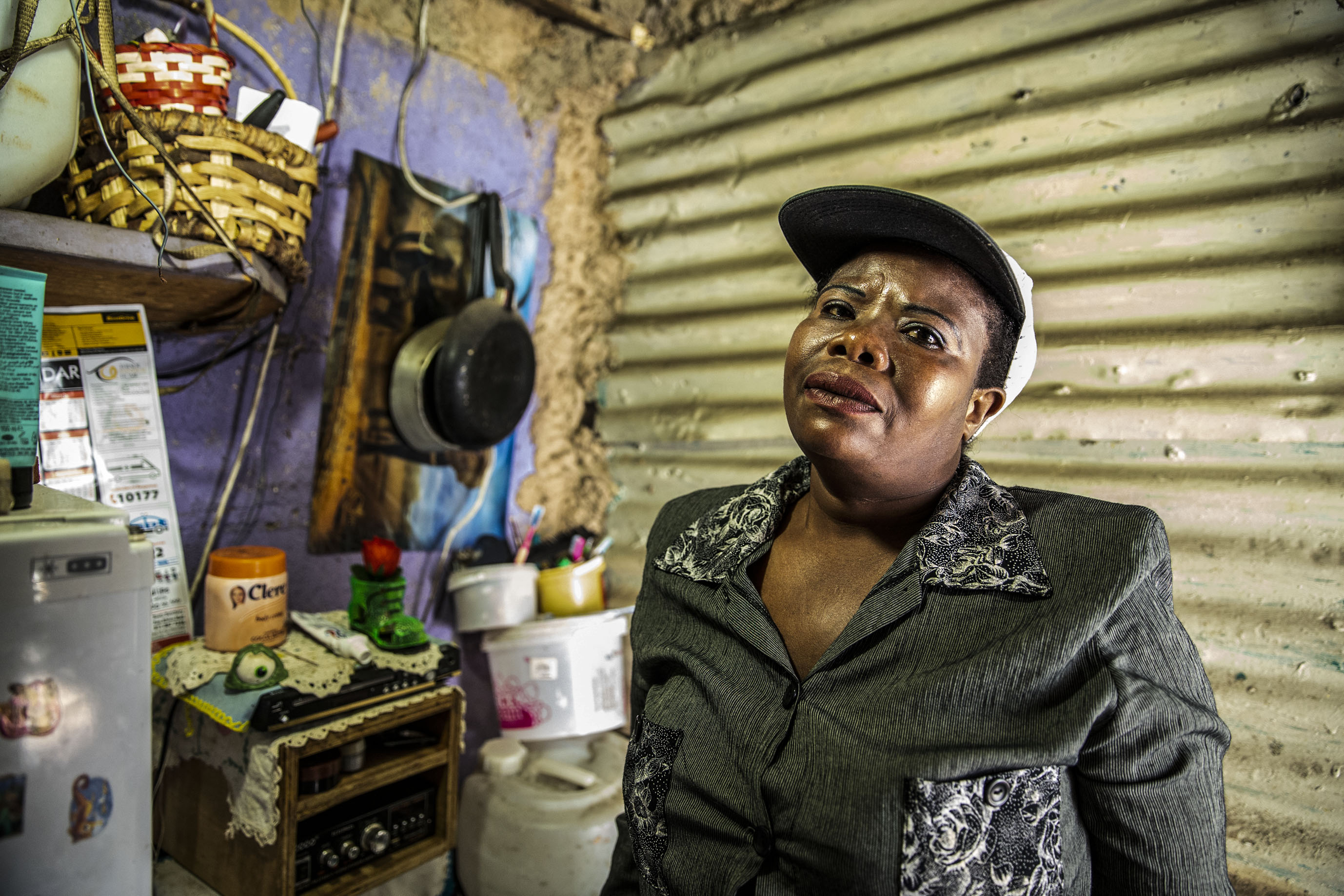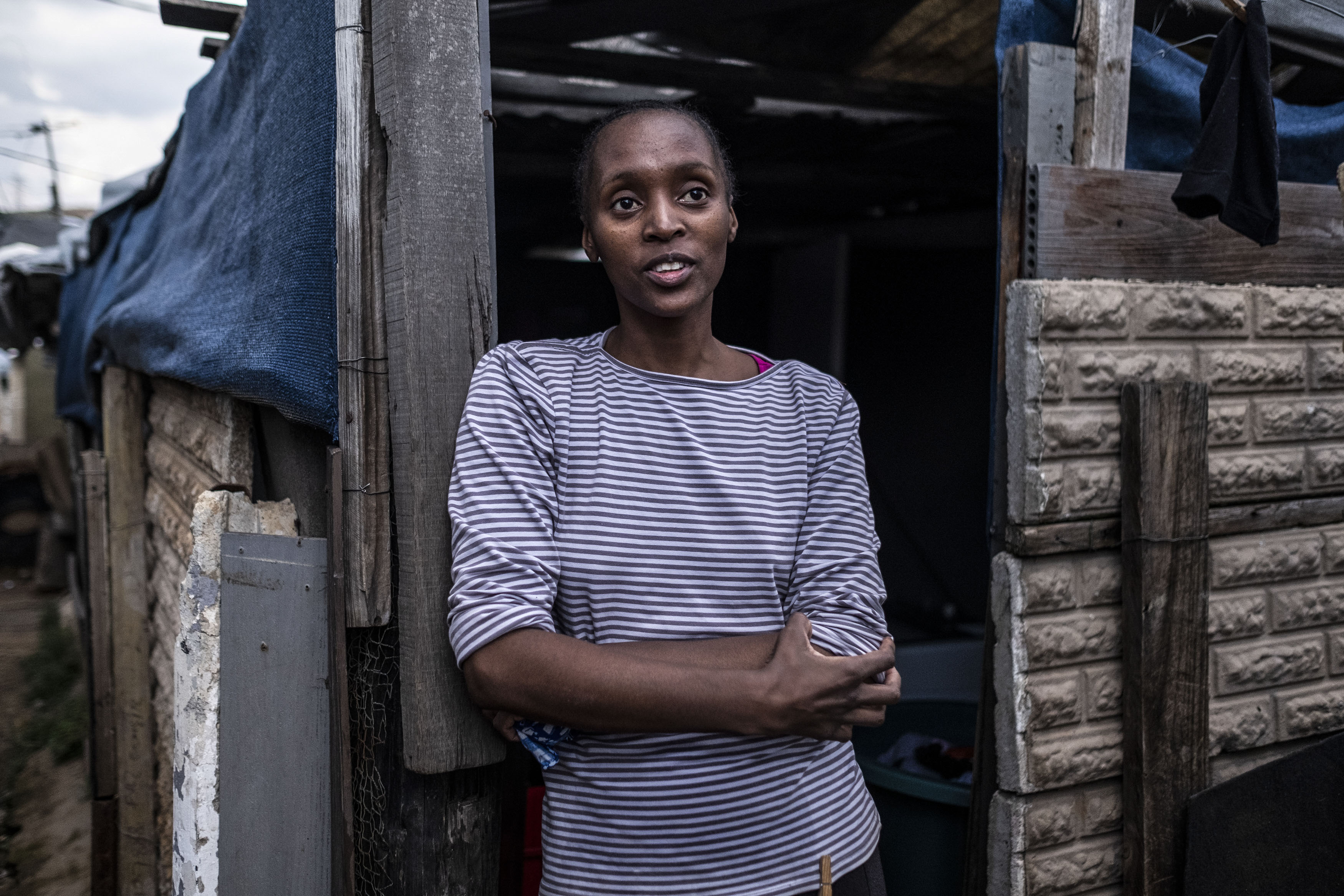Hopeless: Ntombi Dlamini lives in her mothers unfinished house in Alexandra despite having been on the housing subsidy waiting list since 1996. (Wikus de Wet/AFP)
In the corner of Ntombi Dlamini’s room is a wooden box. She keeps everything she owns in it, all neatly squeezed in.
She pulls out a folder that is filed in between her clothing. It’s where Dlamini keeps her identity document, her résumé and other important papers. She used to keep her dompas in that same file.
Dlamini pages through to find one of her old C Forms, as the application for a housing subsidy is known. She has filled out six of these since 1996.
The 59-year-old, who has lived in Alexandra township, Johannesburg, her whole life, longs for her own home. This is why she supports the #AlexShutDown movement, she says.
“I feel very happy, because now I can see where we are going,” Dlamini says of the protests, which kicked off last Wednesday. “Maybe if we can stand up, all of us, the ANC will be forced to look at Alexandra. They mustn’t just take us like parcels, parcels that they can just throw away.”
Earlier in the day, Dlamini and two other women from the neighbourhood — Siphokazi Funo and Lienetia Khorombi — braved the heat to try to get an audience with Gauteng Premier David Makhura. On Tuesday, Makhura and the Gauteng MEC for human settlements, Uhuru Moiloa, met members of the #AlexShutDown committee for two hours before a 10.30am media briefing at the Altrec sports complex.
The media briefing was closed to the public, so the only glimpse the three women got of Makhura was of him driving away in a motorcade of black SUVs.
At the briefing, Makhura brushed off the idea that the #AlexShutDown protests are linked to the slow rolling out of housing in the township. Instead, he emphasised the problems posed by illegal occupations.
On Sunday, Democratic Alliance Gauteng premier candidate Solly Msimanga laid criminal charges against the ANC for allegedly inciting violence in the protests. Makhura also dismissed these claims.
Alexandra’s residents say they are not interested in the political battle between the two parties. And, as the countdown to the national elections ticks on, many of them say they would not know who to vote for.
Talk of politics gets Funo worked up, her ire against the governing party spilling through her red-lipsticked lips. “I don’t want the ANC. I don’t. My party is the ANC, but I don’t want the ANC right now,” she says.
Every now and then her eyes dart to Dlamini for affirmation.
The ANC is in Dlamini’s blood. Her father was a member of the ANC, so her own support of the party was automatic, she says.
But her attempts to secure a housing subsidy have shaken her loyalty. “When you go to the department of housing, they just tell you: ‘Go to town.’ When you get to town they say: ‘Just go and wait.’ They say they will phone you.
“We don’t have houses, but we are always voting ANC,” Dlamini adds, repeating “ANC” three times to the beat of an internal drum.
Khorombi is quiet. She rents a small room off 13th Avenue. Her body brushes both walls as she makes her way through the maze of alleys on the way there.
There isn’t much more space inside: a compact bed competes for room with a fridge, an electric stove top, pots and pans. The fridge, decorated with Jesus stickers, does not work.
Khorombi has lived in this tiny room for five years and in Alex since 1996. She moved therefrom Venda when she got married, but her
husband left her and their four children.
She says the township hasn’t changed at all in the time she has lived there.
Dlamini agrees: “It’s the same. Really it’s the same.”
“The only change we have seen is electricity, because before there was no electricity,” Khorombi adds. The dark lines of her pencilled-in eyebrows hardly move when she speaks.
“It won’t change,” Funo interjects. “Councillors and the mayor eat money. Finished.”
Khorombi says all she wants is a bigger space to live in and a job to help her support her children. “Then I can make something for them,” the 45-year-old says.
 Squalor: Lienetia Khorombi’s shack now has electricity, the only change she says she has experienced in Alexandra since moving to the township in 1996
Squalor: Lienetia Khorombi’s shack now has electricity, the only change she says she has experienced in Alexandra since moving to the township in 1996
Another disgruntled resident, Mumsey Zitha (39), is also preoccupied with the well being of her children. She lives in a shack settlement, colloquially known as Silvertown, on the edge of the Jukskei River. The people living in this areawere moved there 14 years ago to open up land for the Alex Mall. Residents say they were promised RDP housing when they were relocated.
“It’s like we’re living in a dump,” Zitha says, the whites of her eyes glistening.“It feels like we are going to die here.”
The ground is still wet from Monday’s rains. Zitha says her family doesn’t sleep when it rains. “We just stand watching where the water comes through the roof,” she says, standing in the doorway of her zinc home.
“I am always worried,” she says.“I sometimes sit and imagine myself in a better place, where, if it rains, I can sleep. I can’t say I’ve ever been relaxed.”
As Zitha talks, a group of residents — mostly older women — congregate around her. Zitha says they feel defeated, because their complaints over the years have seemingly gone unheard.
“I can say that I am angry with the ANC. I am angry with the DA and the EFF [Economic Freedom Fighters]. All the politicians. Because I haven’t seen any changes,” Zitha says.
“None of them have done anything.We are about to vote and we don’t know who to vote for.”
 Empty: Mumsey Zitha lives in the area known as Silvertown. She and others were moved here 14 years ago to make way for a mall. They are still waiting for the housing promised
Empty: Mumsey Zitha lives in the area known as Silvertown. She and others were moved here 14 years ago to make way for a mall. They are still waiting for the housing promised
Zitha says she feels she and her two children won’t be free as long as they live in Silvertown. “The promises of the new South Africa have been broken,” she says.
On the other side of the Jukskei River, Dlamini echoes this sentiment. She lives in a house built by her mother, who is now in her 80s, in 1998. The two-bedroom house was never completed and its wooden rafters remain exposed.
“I am not free right now because I cannot do anything. This house is not my place, yet I am old,” she says, her eyes welling up with tears. “I feel like I am an outsider.”
Organisers deny political allegiance claims
Members of the #AlexShutDown committee have denied allegations that they are part of a political battle between the ANC and the Democratic Alliance.
#AlexShutDown spokesperson Bobby Solomons said he believes Alexandra is more politically open than it is being made out to be.
“Of course we can only tell for sure after the elections, but for me Alex is split,” he said.
Solomons refused to give credence to claims that #AlexShutDown protests were incited by the ANC.“This narrative that it is the ANC influencing people.Are you telling me that Alex residents are not able to think for themselves? The people who live here are adults.”
Sandile Mavundla, another #AlexShutDown committee member, agreed. “This thing of political affiliation, I am not going to entertain. I’m not even familiar with politics.”
Mavundla said the protests did not happen out of the blue. They were initially planned for March to coincide with Human Rights Month, but they were postponed while the committee endeavoured to get other stakeholders — including a taxi association and business owners — on board.
The committee only informed ANC ward councillors about their plan on the eve of the protests, Mavundla said.
“We told them that we’ll be taking this route. It is either you [the councillors] are with us as a community or against us,” he said.